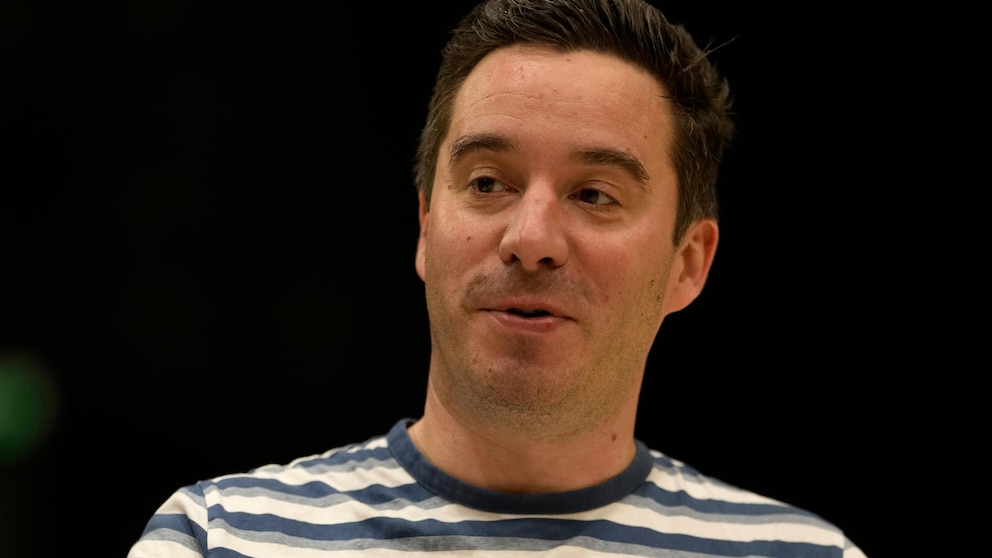
LONDON — Outside of families, few relationships are as intense as those between sports teams and their fans. In the case of England’s bond with its national soccer team, it’s not always been healthy.
James Graham’s play “Dear England” looks at the state of the nation through the ups and downs — and there have been many downs — of England’s men’s soccer team. From 1966 World Cup champions to persistent underachievers dogged by a rump of hooligan supporters, the team became a source of national anxiety.
That changed under manager Gareth Southgate, who since 2016 has forged England’s most cohesive squad in many years. Best known for his low-key manner and three-piece suits, Southgate transformed the team’s fortunes and its culture, drawing new fans and instilling a newfound sense of pride.
That redemptive story inspired Graham to use sports “to make sense of the national moment” for a country that has been plunged into political instability and forced to question its place in the world since the U.K.'s 2016 referendum decision to leave the European Union.
“I think that there is a self-defeating tailspin we get into when we get in trouble,” Graham said, referring to both soccer and society. “As demonstrated in our political system right now. We keep doubling down on the failure.
“I think we could possibly afford ourselves a healthier response to losing whereby you then reset and reform and reinvent — which is what Gareth tried to do,” Graham told The Associated Press during a break in rehearsals.
Graham has become Britain’s go-to writer for state-of-the-nation drama with an entertaining twist. He turned backroom 1970s parliamentary machinations into riveting drama in “This House,” charted the rise of media mogul Rupert Murdoch in “Ink” and skewered a TV game-show cheating scandal in “Quiz.” Graham also scripted “Sherwood,” a TV detective drama steeped in the divisive legacy of Britain’s 1980s coal miners’ strike.
Actor Joseph Fiennes, who plays Southgate with quiet intensity, said “there’s an absolute sense of joy which is at the heart of James’s writing” which lets the audience know “they’re there to have fun.”
“And when you have fun, that experience can take you to places and get you to challenge ideas about yourself — identity, national identity, psyche, masculinity, mental health,” said Fiennes, whose screen performances include the title role “Shakespeare in Love” and an authoritarian patriarch in TV drama “The Handmaid’s Tale.”
The play’s title comes from the open letter Southgate wrote to the nation on the eve of the European championships in 2021, praising his team and their role in forging “a much more tolerant and understanding society” and stressing the sport’s ability to “inspire and unite.”
Graham frames it as a tale of redemption from a shattering moment in Southgate’s career as a player — his failed penalty kick in the semi-finals of the 1996 European championships that sent England out of the tournament.
Fiennes said that made Southgate “the patron saint of penalty failures” – and gave him a deep empathy for his young players and a determinastion to make things better for them than they were for him.
The psychology of make-or-break penalty kicks fascinates Graham, who as a 14-year-old watched Southgate miss that shot in 1996. He said it was the first time he felt “the universe saying, just because you want it doesn’t mean you deserve it, or doesn’t mean it’s going to happen.”
“I love the metaphor of what the penalty represents, way beyond sport,” Graham said. “That moment when you have to make a decision and then there’s a consequence of that decision and it’s how you then deal with that failure or that loss. And that could be going on a date, going for a job. It could be anything. I feel like I’m constantly walking up to a ball and making a decision.”
Graham says part of “Gareth’s gentle journey” has been to exorcise the “toxic tribalism” the team can attract. English soccer has become more family-friendly and its fans more diverse, helped by the inspiring success of the women’s squad, the Lionesses, who won the European championship in 2022.
A year earlier, the men’s team made it to the final of the Euros, but did not get a fairytale ending. Amid outbreaks of fan violence, England lost the game — on penalties, of course — and the young Black players who had missed their shots received a torrent of online abuse.
Not everyone welcomes the players’ decision to take the knee and speak out against racism, or supports player Marcus Rashford’s anti-poverty campaigning.
And Southgate still hasn’t led England to a major trophy. The play ends at the 2022 World Cup in Qatar, where – spoiler alert — England lost to France in the quarter-finals.
That provides a perfect, poignant ending for a play. But Graham wishes it had been different.
“I would probably sacrifice the ending of the play that we have for England to have won the World Cup again and just got rid of that itch that we can’t seem to scratch.”
“Dear England” runs at the Prince Edward Theater in London until Jan. 13 and gets a cinema release across the U.K. and Ireland in January.
Sourse: abcnews.go.com






